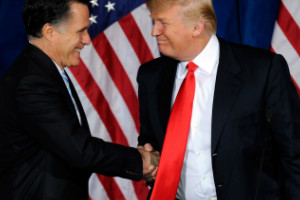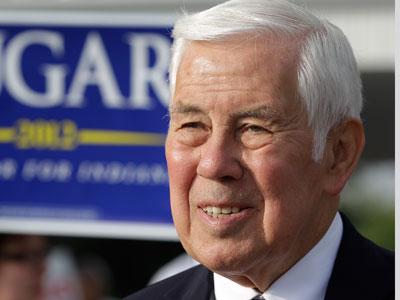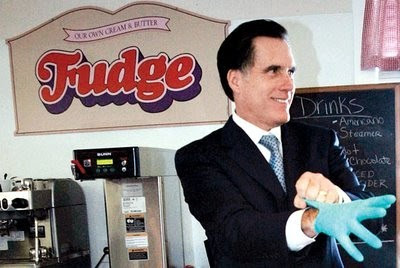The more things don’t change, part 2 –Trump and birtherism
This week’s utterances from Donald Trump actually revisit his earlier statements about President Obama’s birth certificate, somewhat more indirectly. For those who have forgotten, CNN’s Anderson Cooper aired lengthy interviews with Trump, at Trump’s request uncut, April 25 and April 26, 2011. The interviews followed CNN’s own investigation of archives in the state of Hawaii during the CNN investigation of Obama’s birth certificate. Some of the transcript from the Apr. 25, 2011, program is posted at bottom. Owing to length, some of it will have to go up later.
Back to this week–we need a dramatic-comic reading. Trump, the man who has been working overtime to bring birtherism back on to the map, is using rhetorical tactics passed down to us from the Greeks and Romans, presumably the sleazier Greeks and Romans. Among them, a professed agnosticism on whether President Obama was born in the United States, a pretend dubiety that makes an accusation while pretending not to. Here is one of Trump’s thin disavowals:
[from transcript]
“(BEGIN VIDEOTAPE)
ACOSTA (voice-over): Mitt Romney is once again letting it ride by Donald Trump. Just hours before Romney attends a fund-raiser hosted by Trump on the Las Vegas Strip, the real estate tycoon is still voicing his doubts about whether President Obama was actually born in the U.S.
DONALD TRUMP, CHAIRMAN & CEO, TRUMP HOTELS & CASINO RESORTS:
I have never really changed. Nothing’s changed my mind. He doesn’t have a birth certificate. Now, he may have one . . .” [italics added]

Trump
For all the publicity over this week’s graceless comments, Trump was actually brasher back in spring 2011, when he was still thinking of running for president:
[from transcript]
“(BEGIN VIDEO CLIP)
DONALD TRUMP, CHAIRMAN & CEO, TRUMP HOTELS & CASINO RESORTS:
I have people that actually have been studying it, and they cannot believe what they’re finding.
UNIDENTIFIED FEMALE: You have people now down there . . .
(CROSSTALK)
TRUMP: Absolutely.
UNIDENTIFIED FEMALE: . . . searching in Hawaii?
TRUMP: Absolutely. And they cannot believe what they’re finding.
UNIDENTIFIED FEMALE: You say that you have sent investigators there. Have your investigators been able to unearth anything more that has given your argument credence?
TRUMP: I will let you know that at a future date. I will let you know that at a future date.”
The future date never came. As we know, the president released his long-form birth certificate, Trump decided not to run for the White House, and we have yet to see those hired Trump investigators, either on television or in any other medium or forum. But Trump is back in the news, for only a slighter softer version of the same already-discredited remarks.

Bacon
Not that the history goes back only to April 2011. Here for the record is Francis Bacon on the Donald Trumps of the world, from the seventeenth-century essay “Of Boldness”:
“So these men, when they have promised great matters, and failed most shamefully, yet (if they have the perfection of boldness) they will but slight it over, and make a turn, and no more ado. Certainly to men of great judgment, bold persons are a sport to behold; nay, and to the vulgar also, boldness has somewhat of the ridiculous. For if absurdity be the subject of laughter, doubt you not but great boldness is seldom without some absurdity. Especially it is a sport to see, when a bold fellow is out of countenance; for that puts his face into a most shrunken, and wooden posture; as needs it must; for in bashfulness, the spirits do a little go and come; but with bold men, upon like occasion, they stand at a stay; like a stale at chess, where it is no mate, but yet the game cannot stir. But this last were fitter for a satire than for a serious observation.”
A good onstage reading of Trump from transcripts would interlace Trump’s statements with their models defined in Prof. Richard Lanham’s Handlist of Rhetorical Terms.
Here, pulling out more from the archaic stockpile, is Trump in the May 29 interview with Wolf Blitzer on CNN:
[from transcript]
“WOLF BLITZER, CNN: Joining us now from Las Vegas on the phone is the chairman and the president of Trump Organization, Donald Trump. Donald, thanks very much for joining us.
DONALD TRUMP, CHAIRMAN AND CEO, TRUMP HOTELS & CASINO RESORTS: I thought your reporter was very inaccurate in his description. And I thought the introduction was totally inappropriate and was actually very dishonest.
BLITZER: Well, tell us why.
TRUMP: Well, because what he said was wrong and what he said was almost as though President Obama wrote it, but I’m sure he knows that. And I thought it was a very inappropriate introduction. But go ahead with your first question.
BLITZER: Well, I don’t–you–is there a specific issue you want to dispute that he mentioned, because, if you do, I want to give you a chance . . .
(CROSSTALK)”
Not to give away the ending here, but this Trump interview reads like any transcript through the ages, when an interlocutor tries to pin sleaze down and the pinnee tries to wriggle out from under.
Tactic A: Pre-emptive accusation against the interlocutor, above.
Tactic B: Pretext that the target is really the source. Continuing,
“TRUMP: Obama does not like the issue of where he was born. His own publisher, as you know, using his words, said he was born in Kenya and he lived in Indonesia. Of course, now he’s denying that, amazingly.”
Also above, Tactic C: Now, I know he doesn’t want me to say this . . . Insinuation that speaker is blowing open a story covered up by nefarious others.
Tactic D: I come to bury Caesar, not to praise him. Speaker claims that he’s not really here to say what he’s saying:
“[Trump] So–but I’m not here to talk about that. I’m here to talk, as you said you would, jobs, China, what’s going on with respect to China and how they’re ripping this country, what’s going on with respect to OPEC and how the nations of OPEC are laughing at the stupidity of our country. That’s what I’m here to talk about.
BLITZER: All right.
TRUMP: You know that’s what I’m here to talk about, and I thought your introduction was highly inappropriate. But that’s OK, because I have gotten to know you over the years.
BLITZER: Well, I–well, listen, Donald, first of all, I never said we weren’t going talk about the birther issue. We had a conversation earlier today. We didn’t discuss at all what we were going to talk about.
(CROSSTALK)
TRUMP: It’s something that bothers Obama very much.
BLITZER: I don’t know why you’re . . .
TRUMP: And I will tell you, it’s not an issue that he likes talking about. So what he does is uses reverse psychology on people like you, so that you report like, oh, gee, he’s thrilled with it. He does not like that issue because it’s hitting very close to home. You know it and he knows it.”
Reiterates tactics already used. Blitzer seems bemused at the overt attack on him and on CNN reporter Jim Acosta.
Now we get to the meat of the accusation. Tactic E: Speaker puts accusation into others’ mouths:
“(CROSSTALK)
BLITZER: I don’t know it. Donald, you and I have known each other for a long time. And I don’t understand why you’re doubling down on this birther issue after the state of Hawaii formally says this is the legitimate birth certificate. He was born in Hawaii. Why are you going through all of this, Donald?
TRUMP: Well, a lot of people don’t agree with that birth certificate. A lot of people do not think it’s authentic.”
Tactic F: Speaker attempts to discredit documentary evidence.
“BLITZER: But if the state of Hawaii authorizes it, if the state of Hawaii says, this is official, he was born in Hawaii on this date, here it is, why do you deny that?
TRUMP: A lot of people do not think it was an authentic certificate.
(CROSSTALK)
BLITZER: How can you say that if the . . .
(CROSSTALK)”
Reiterates that the accusation actually comes from others.
“TRUMP: Now, you won’t report it, Wolf, but many people do not think it was authentic.
His mother was not in the hospital.” [italics added]
Tactic G: Fabrication.
“There are many other things that came out. And, frankly, if you would report it accurately, I think you would probably get better ratings than you’re getting, which are pretty small.”
Tactic H: Hint of yet undisclosed corroboration. Re-uses tactic of attacking interlocutor.
“BLITZER: Donald, have you seen the actual newspaper announcements within days of his birth in Honolulu, for example, “The Honolulu Star- Bulletin”? We will put it up there. You see the birth announcement back in 1961.
(CROSSTALK)
BLITZER: Listen to me, Donald.
(CROSSTALK)
BLITZER: Can I ask . . .
(CROSSTALK)
TRUMP: Am I allowed to talk, if you could stop defending Obama?
(CROSSTALK)
BLITZER: Donald, Donald, you’re beginning to sound a little ridiculous, I have to tell you.
TRUMP: No, I think you are, Wolf.
Let me tell you something. I think you sound ridiculous. And if you would ask me a question and let me answer it, instead of making . . .”
Tactic I: Speaker accuses others of not letting him speak/answer.
“BLITZER: Here’s the question. Did the conspiracy start in 1961, when “The Honolulu-Star Bulletin” and “The Honolulu Advertiser” contemporaneously published announcements that he was born in Hawaii?
TRUMP: That’s right. And many people put those announcements in because they wanted to get the benefit of being so-called so-called born in this country. Many people did it. It was something that was done by many people, even if they weren’t born in the country. You know it, and so do I. And so do a lot of your viewers.”
Reiterates tactic of putting his accusation into others’ mouths. Tactic J: Lumps the falsely accused in with actual misfeasors. [Note: The idea that the birth notice was placed falsely by parents was rebutted by Anderson Cooper on CNN, more than a year ago. See transcript below.]
“BLITZER: Donald, explain why–so why did the state of Hawaii authorize that live birth certificate? Why did they do it? Are they part of this conspiracy as well?
TRUMP: Well, your Democratic governor who was the one that was really leading it, a lot of people say, where did it come from? And they’re saying how come he didn’t show it to John McCain, Hillary Clinton? It was only Donald Trump that got him to do it.
So, you know that, and I know that. And when you say that Obama doesn’t mind this, Obama hates this subject. When his publisher comes out with a statement from him made in the 1990s that he was born in Kenya and that he was raised in Indonesia, and all of a sudden it comes out, I think it’s something that he doesn’t like at all.
Now, what he says is, oh, we love it, we love it, we love it, because that’s . . .
(CROSSTALK)
BLITZER: Donald, let me tell you–let me tell you who hates this subject. It is Mitt Romney, who totally disagrees with you on this, including today. He issued a statement.
(CROSSTALK)
TRUMP: I don’t speak to Mitt Romney about it.”
As mentioned, Trump has actually been less indirect in the past, look at some of his earlier remarks. The transcripts below are from Apr. 25, 2011:
From Fox News Network:
“And you know he can say what he wants, but the fact is that this guy has not revealed his birth certificate. A lot of people agree with me. I tell you what, with all that I do, what I do best is China, jobs, OPEC, all of this. That’s what I do best.
That’s going to be my strength. It is my strength. I really understand it. I know the people. But with all of that, I think I get more positive–when I’m talking down the street, when I did–recently I did a Tea Party event, and we had a tremendous crowd. They loved this issue.
There are so many people that really want him to provide his birth certificate. I mean now you have states going out and saying, in order to run for office, you have to be able to provide a birth certificate.
There is a big lot of things going on with respect to the birth certificate. You know why did he spend–why is he spending millions of dollars to fight this issue instead of just providing his birth certificate? There are so many different elements here and I will say, it’s a very frightening thing for this country.”
From CNN, same day:
“ANDERSON COOPER, CNN ANCHOR: Tonight: the birther battle that keeps on building. Donald Trump is on the program tonight leveling surprising new claims about President Obama’s birth certificate, Trump now saying he believes it’s missing or doesn’t even exist.
As for proof? Well, as you will hear, he has none. Remember, Trump has said for weeks now that he has a team of investigators on the ground in Hawaii looking into the president’s birth certificate. But he’s offered no proof. We decided to send our own team to Hawaii to investigate as well. And over the next two nights you’re going to see what they found. They were there for five days interviewing and talking to dozens of people.
By the way, none of the people they talked to said that they’d been contacted by anyone working for Donald Trump. We spoke exclusively to the health official who at the orders of the Republican governor actually went and examined Mr. Obama’s original 1961 birth certificate. We spoke to the newspaper that ran his birth announcement and the people who knew his family and have known him since the day he was born almost 50 years ago in Honolulu.
Now, before we show you what we found, let’s just quickly go over some of the basics. This is President Obama’s certificate of live birth. This is the only document that Hawaii now considers to be official proof of birth in the state. This is the document the state gives you, any resident of Hawaii, anyone born in Hawaii, when you request proof of birth from the state.
It gets you a driver’s license in Hawaii, and the U.S. State Department accepts it as valid proof for citizenship when you’re applying for something like a passport. Now, this is the picture of the certificate of live birth that President Obama ordered from the state during the campaign. Take a look up close.
It’s got an official stamp with a stamped signature and a raised seal. It’s been examined by a number of news organizations and nonpartisan groups. You and I can’t get our own copy of this document even with the president’s permission. And by law, you or I could not go look at the president’s original 1961 birth certificate, which is in the Department of Health in Honolulu according to authorities there.
However, anyone could go to the Hawaii Vital Statistics Office and look at official birth information that’s called index data. It’s stored in a government binder. It’s an alphabetized list of all the babies born in Hawaii. And in the book containing births from 1961 to 1964 you will find a listing for Barack Hussein Obama. II, gender male. Here’s also the local paper’s birth announcement. It’s not an ad, by the way, placed by the parents or the grandparents.
These were official announcements just like sheriff sales and other public notices. The paper would get them straight from the Department of Health. That’s how it works. So you have got the official document the state sends out, recognized by the state and the federal government. You have got a birth announcement with officially provided information from back in the day. [emphasis added]
And you have got Republican state officials who said the original birth certificate is absolutely there. Now, this information as you all know has been out there for years, but still the confusion, in some cases conspiracy theories exist. So we decided to send our team to Hawaii to try to clear up the confusion. In a moment we will talk to Donald Trump.”
continued in later post























